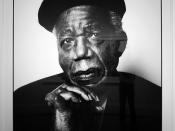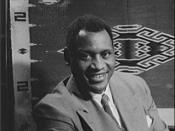In looking at Things Fall Apart, and its representation of two entirely dissimilar groups of people, cultural superiority is questioned. When diverse cultures cross, there is controversy concerning which way of life is better. One culture may feel that the way of life they have been living is better than the other. However, it is not for any ethnicity to say their society is better than another. In fact, a group may actually be causing harm to another by simply trying to prove their culture is better. It is clear that for the Ibo people, the Ibo culture is best for their lives. This becomes evident by observing how the natives view and respect their culture, how the government of the Ibo tribe functions, and how the Christian culture disrespects the Ibo.
Achebe provides examples of how the natives feel about their own culture. They highly respect their culture and religion.
Their religion has many Gods who keep order among the people. Achebe is very concerned with representing the Umuofia Tribe as having a distinct culture and civilization. The tribe is very cultural and its people believe sincerely in their Gods. When they break the Kola nuts and make offerings, they show they are civilized and respect one-another. Also, the Ibo are cultured enough to understand and differentiate among different customs. "You say there is one supreme God who made heaven and earth," said Akunna on one of Mr. Brown's visits. We also believe in Him and call Him Chukwu."(Pg. 179) By contrasting the two religions in this way, Achebe indicates that these natives are very proud of their religion and are capable of understanding and relating their religion to the newly come Christianity. It is important that the natives are proud of their religion. This shows they are cultured people, proud of their society. Any society with proud people, who back it up, is a good society.
By observing how the Ibo government functions, it is noticeable that the people are very much concerned with the ongoing events of the tribe. The Ibo government focuses on what is best for the people and lets its followers take part in governmental meetings. It is a culture in which people who work hard are recognized and greatly honored with power and respect. The clan judges a man by the work of his hands. This was why Okonkwo had been chosen to carry a message of war to their enemies. Within the Ibo society men of high title and elders often gather to make decisions, which affect an entire group of villages. They met to discuss going to war, to discuss the carrying out of wishes put forth by religious leaders, to serve as judges at trials, and to support the traditions of the clan. These are men who have earned the respect of the villages because of their achievements. On page 138, the Ibo show how they respect achievers and consider them all leaders without giving a single person absolute power. In this passage the English missionaries ask who the king of the village is, but the villagers tell them that there is no king. "We have men of high title and the chief priests and the elders," they said. A society with several leaders is most successful because it has several people working together to stumble on the smartest choice for an important decision that has to be made.
The Christians clearly show no respect for the Ibo people. The Christians are trying to expand their religion over the tribe. They feel the Ibo people are uncivilized and have to teach them to be civilized. They show their disrespect in the jail scene after Okonkwo and the other clansmen are arrested. "The head messenger took down his razor and shaved off all the hair on the men's heads."(Pg. 195) This clearly provides an example of disrespect and animosity towards the natives from the civilized white men. The civilized men do not embrace the culture of the African tribe. The Commissioner of the whites is not concerned really with learning about the different cultural distinctions, but rather with bettering himself and his own society while representing the natives the way he deems appropriate. Since the white man has disrespected the natives so much, it is clear that the Ibo people do not want to follow an odd culture in which they are considered savage-like and uncultured. They would have to go against all they have ever known and believed to be true in order to follow the missionaries' culture. Yet, they would not even be respected for it.
In conclusion, Achebe reveals the misunderstandings that can arise when two different cultures encounter each other. The missionaries who come to the village believe sincerely in the doctrines of Christianity. The Ibo people, however, believe just as sincerely in their ancestral spirits and the many gods of their religion. It is evident that the Ibo people had a well-organized lifestyle in which they were content, before the presence of Christians in their society. Their lives were precisely fashioned through traditions passed down from generation to generation, which preserved order in the tribe. When the missionaries arrived, it introduced an entirely new way of life, which the Ibo people did not know how to deal with. This was because they didn't have any guidelines to follow from previous generations since the missionaries had not come to the tribe before. It brought chaos to the tribe when they were perfectly content and productive with their way of life. Therefore, the Ibo culture is better suited for their lifestyle. Achebe's Things Fall Apart shows how chaos relates to any situation in which traditional values are called into question and people from different cultures meet for the first time.





